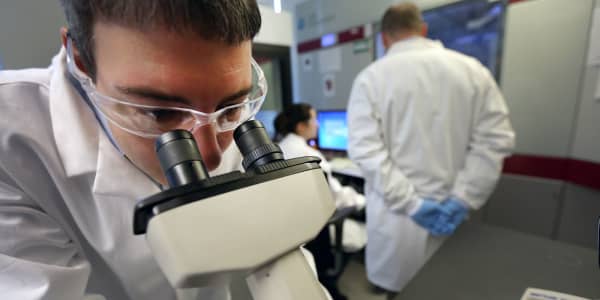The baby boomers are becoming seniors, and Generation Z is showing an increased interest in staying healthy. So it's not that surprising that the field of home medical technology is booming these days.
Triacta estimates that the number of people using home health tech globally will grow from 14.3 million in 2014 to 78.5 million in 2020 — with the North American and European markets responsible for most of that. And companies are rushing to get a piece of that pie.
Whether it's devices to monitor your heart rate or a gadget that makes it easier to check someone's temperature, there are a wide variety of MedTech items due out this year (some with FDA clearance, some not). Here are some of the ones that have recently hit store shelves or are on the way in 2016.
— By Chris Morris, special to CNBC.com
Posted 29 January 2015
Under Armour Healthbox ($400)
Under Armour is a leader in sports fitness, but now it's expanding into health monitoring. This three-device setup includes a wearable tracker (which monitors things like steps, workout intensity and workout duration), a chest-strap heart rate monitor and a smart scale (which tracks data for up to eight people). They're all tied together through an Under Armour app that makes it easy to view data from all of the devices in a single place.
TempTraq ($24.99)
Taking the temperature of a sleeping child can be tricky. You want your little one to get rest, but it's often important to monitor their fever. This $20 wearable smart monitoring patch goes under the arm and monitors a baby's temperature for 24 hours, relaying the information to a smartphone. You'll also know at a glance if the fever is on the rise; TempTraq changes colors as the wearer's temperature rises and falls.
Emfit QS Sleep Monitor ($274)
More and more, health experts are emphasizing the importance of a good night's rest (which, ironically, is getting harder and harder for many people). EmFit eschews the usual wristband, instead slipping under your mattress. It's still able to track your heart rate and other critical information to let you see the next morning how well you slept — and, as embarrassing as it might be, how much you snored.
Withings Thermo ($99.95)
Ear-based thermometers are often fast, but their reliability is sometimes off. Under-the-tongue thermometers are more reliable, but take a longer time. Thermo uses 16 infrared sensors aimed at the temple of the forehead to get a quick, accurate reading from the temporal artery. In just two seconds, the sensors will take 4,000 separate measurements, correcting for things that could affect accuracy, like the room's ambient temperature.
Hush Earplugs ($150)
The idea of "smart" earplugs might seem like technology has gone too far, but Hush could be a godsend for anyone whose bedmate snores regularly. The two wireless plugs fit in your ears and play masking sounds, such as white noise, but can be programmed to allow in phone calls or alarms.
The company says the earplugs last all night and can be recharged in their storage box.
Qardiobase ($149)
The bathroom scale can do a lot more than shame you into easing back on the pizza these days. QardioBase watches not just your weight but also your body fat, body mass index (BMI), water makeup, muscle mass and water/bone composition. The scale pairs with an app that features several modes, including Pregnancy, where you can choose to bypass your weight every time you step on the scale — but it will still record the value to share with your doctor.
Owlet Smart Sock Baby Monitor ($249)
Newborns are supposed to sleep on their backs, but sometimes they flip over to their stomach, much to the worry of new parents. This $249 smart sock works with an alert station to let parents know if there's an issue with their child's heart rate or oxygen level.
When trouble arises, the base station will sound an alarm and automatically send an alert to linked cellphones as well, in case parents have managed to sneak out for a date night.
Beddit SmartSleep ($149)
Like EmFit's sleep monitor, Beddit doesn't use a wristband. Instead, it slips a thin band under your sheets to keep a closer watch on you. The information it provides can be very granular, though. It will tell you precisely when you fell asleep, how restless you were and how efficient your sleep was.
Pair the device with your Apple Watch and it will even tell you when you need a nap, based on the previous night's information.
iHealth Rhythm (N/A)
Hospital-grade heart rate monitoring comes to the home in this wireless device. An ultra-flat recorder that clips onto a three-electrode patch, iHealth Rhythm is positioned on the sternum of the patient and keeps a close watch on your ticker, sending the data immediately along to your doctor via a secure cloud for up to 72 hours. That can help with both diagnoses and treatment options — and could be especially useful for victims of recent heart attacks.
Veta EpiPen Case ($59 pre-order)
EpiPens save lives, but they can be easy to forget when you're dashing out of the house. Veta is a bluetooth EpiPen case that sends a push notification to your phone if the two are separated by too great a distance. Can't find your EpiPen? You can use the corresponding app to set off a loud alarm and flashing lights on Veta.
Finally, parents can set up the case to send an alert when the EpiPen is taken out of the case, immediately letting them know when their child is having a possible allergic reaction.




